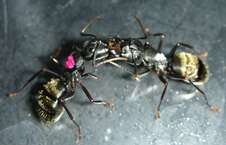Ant colonies share disease resistance

(�鶹��ԺOrg.com) -- A Northeastern University biology professor and her team of student researchers have discovered that the social feeding habits of carpenter ants reduce disease transmission and widespread infection within the colony, in much the same way that a mother’s milk helps her child boost his immune system against foreign organisms.
The results of the study were published in a June issue of Biology Letters, a peer-reviewed scientific journal.
Although the research focused on social insects, the team’s findings could eventually be applied to solving complex problems in fields of study as diverse as human disease and salmon farming, says coauthor Rebeca Rosengaus, an associate professor of biology. Brian Lejeune, a third-year chemical engineering major and biology minor, and Northeastern alumnus Casey Hamilton, now a graduate student in biology at Towson University, collaborated on the study.
“Our study shows that immune responses generated by individual carpenter ants are actually shared with members of the society in which they live,” says Rosengaus. “If we could figure out if other animals reared at high densities share their individual immune responses in the same way as ants, then we may reduce losses in production.”
Carpenter ants live in densely populated, microbe-rich environments, where chance of infection and disease transmission runs high. Northeastern researchers set out to discover whether their social nature—they have a tendency to lick and groom each other and share liquid nutrients through mouth-to-mouth mutual feeding—makes it more or less likely that they would spread disease.
To find out, Lejeune injected one group of carpenter ants with a vaccine known to stimulate immune responses and another with a benign saline solution. Unvaccinated ants that were fed by their vaccinated nest-mates lived longer than ants fed by saline-injected nest-mates.
The results indicate that individual immune responses can be redistributed to a colony through social interactions, thus facilitating disease resistance.
Lejeune, who recently returned from California’s Redwood Forest, where he and Rosengaus collected termites for future experiments, said the opportunity to immerse himself in hands-on research was valuable experience. “I’m getting used to using lab techniques and developing good lab practices,” he said. “I’m doing data analysis and thinking about how to devise my own experiments.”
Provided by Northeastern University















